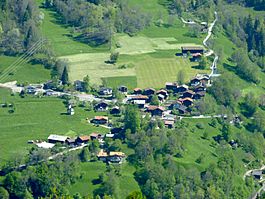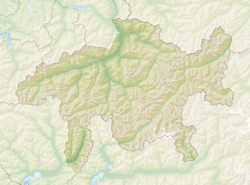Lüen facts for kids
Quick facts for kids
Lüen
|
||
|---|---|---|

Lüen village
|
||
|
||
| Country | Switzerland | |
| Canton | Graubünden | |
| District | Plessur | |
| Area | ||
| • Total | 3.46 km2 (1.34 sq mi) | |
| Elevation | 990 m (3,250 ft) | |
| Population
(2010)
|
||
| • Total | 84 | |
| • Density | 24.28/km2 (62.9/sq mi) | |
| Postal code |
7027
|
|
| Surrounded by | Castiel, Praden, St. Peter-Pagig, Tschiertschen | |
Lüen was once a small town, or "municipality," in Switzerland. It was located in the Graubünden area, which is a "canton" (like a state). Lüen was part of the Plessur district.
On January 1, 2013, Lüen joined with several other nearby towns. These included Calfreisen, Castiel, Langwies, Molinis, Peist, and St. Peter-Pagig. All these places became part of a larger town called Arosa.
Contents
History of Lüen
Lüen is a very old place. The first time it was ever written about was in the year 1084. Back then, its name was spelled Leune.
Where Lüen Is Located
Before Lüen joined with Arosa, it covered an area of about 3.5 square kilometers (about 1.35 square miles).
Land Use in Lüen
- About 37% of the land was used for farming.
- Over half, 52.3%, was covered by forests.
- A small part, 1.4%, had buildings or roads.
- The rest, 9.2%, was non-productive land like rivers or mountains.
Village Layout
Lüen was a special type of village called a haufendorf. This means it was an unplanned village. Its buildings were packed closely together around a central area. The village was built on the north side of the mid-Schanfigg valley.
Getting Around
Lüen has a train station called Lüen-Castiel. This station is on the Chur-Arosa railway line. It also serves the nearby town of Castiel.
People of Lüen
In 2010, Lüen had a population of 84 people.
Population Changes
- In 2008, about 10.6% of the people living in Lüen were from other countries.
- Over the ten years before 2010, the number of people living in Lüen went down by about 15.6%.
Languages Spoken
Most people in Lüen speak German. In 2000, about 91.9% of the population spoke German. English was the second most common language (4.1%), and Dutch was third (2.7%).
Age Groups
In 2000, the population of Lüen was almost evenly split between males and females. About 49.4% were male and 50.6% were female.
Here's a look at the age groups in 2000:
- Children (0-9 years old): 8 people (10.8%)
- Teenagers (10-19 years old): 11 people (14.9%)
- Young adults (20-29 years old): 1 person
- Adults (30-39 years old): 14 people (18.9%)
- Adults (40-49 years old): 14 people (18.9%)
- Adults (50-59 years old): 4 people (5.4%)
- Seniors (60-69 years old): 14 people (18.9%)
- Seniors (70-79 years old): 6 people (8.1%)
- Seniors (80-89 years old): 2 people (2.7%)
Education and Jobs
Many adults in Lüen have a good education. About 70% of people aged 25-64 have finished high school or gone on to higher education. This could be a university or a specialized college called a Fachhochschule.
Lüen had a low unemployment rate of 1.75%. This means most people who wanted to work had jobs.
Types of Jobs
- In 2005, 5 people worked in the primary economic sector. This means jobs like farming or forestry. There were 2 businesses in this area.
- 9 people worked in the tertiary sector. This includes jobs that provide services, like shops or tourism. There were 3 businesses in this sector.
Historical Population
The table below shows how Lüen's population changed over many years:
| Year | Population |
|---|---|
| 1850 | 83 |
| 1900 | 68 |
| 1950 | 77 |
| 2000 | 74 |
Places to See in Lüen
The buildings in Lüen show a mix of different cultures. You can see houses built with wooden blocks. These were brought by the Walser people, who moved into the area later. You can also see houses made of stone. These were typical of the local Romanic people.
Important Buildings
- The train station of Lüen-Castiel was built in 1914.
- The old Romanesque church of St. Zeno was built in 1084.
- Inside the church, you can see beautiful Gothic paintings. These were made around the mid-14th century by artists from the Waltensburger Master's studio.
Inside the Church:
See also
 In Spanish: Lüen para niños
In Spanish: Lüen para niños
 | James B. Knighten |
 | Azellia White |
 | Willa Brown |








